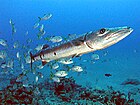
Aquaculture, also known as aquafarming, is the controlled cultivation ("farming") of aquatic organisms such as fish, crustaceans, mollusks, algae and other organisms of value such as aquatic plants. Aquaculture involves cultivating freshwater, brackish water and saltwater populations under controlled or semi-natural conditions, and can be contrasted with commercial fishing, which is the harvesting of wild fish. Aquaculture is also a practice used for restoring and rehabilitating marine and freshwater ecosystems. Mariculture, commonly known as marine farming, is aquaculture in seawater habitats and lagoons, as opposed to freshwater aquaculture. Pisciculture is a type of aquaculture that consists of fish farming to obtain fish products as food.

Seafood is any form of sea life regarded as food by humans, prominently including fish and shellfish. Shellfish include various species of molluscs (e.g., bivalve molluscs such as clams, oysters, and mussels.

Fishery can mean either the enterprise of raising or harvesting fish and other aquatic life or, more commonly, the site where such enterprise takes place. Commercial fisheries include wild fisheries and fish farms, both in freshwater waterbodies and the oceans. About 500 million people worldwide are economically dependent on fisheries. 171 million tonnes of fish were produced in 2016, but overfishing is an increasing problem, causing declines in some populations.
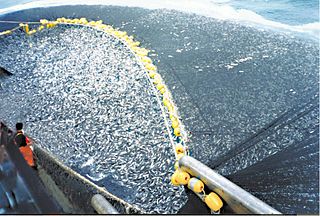
Overfishing is the removal of a species of fish from a body of water at a rate greater than that the species can replenish its population naturally, resulting in the species becoming increasingly underpopulated in that area. Overfishing can occur in water bodies of any sizes, such as ponds, wetlands, rivers, lakes or oceans, and can result in resource depletion, reduced biological growth rates and low biomass levels. Sustained overfishing can lead to critical depensation, where the fish population is no longer able to sustain itself. Some forms of overfishing, such as the overfishing of sharks, has led to the upset of entire marine ecosystems. Types of overfishing include growth overfishing, recruitment overfishing, and ecosystem overfishing.

A conventional idea of a sustainable fishery is that it is one that is harvested at a sustainable rate, where the fish population does not decline over time because of fishing practices. Sustainability in fisheries combines theoretical disciplines, such as the population dynamics of fisheries, with practical strategies, such as avoiding overfishing through techniques such as individual fishing quotas, curtailing destructive and illegal fishing practices by lobbying for appropriate law and policy, setting up protected areas, restoring collapsed fisheries, incorporating all externalities involved in harvesting marine ecosystems into fishery economics, educating stakeholders and the wider public, and developing independent certification programs.

The Marine Stewardship Council (MSC) is a non-profit organisation which aims to set standards for sustainable fishing. Fisheries that wish to demonstrate they are well-managed and sustainable compared to the MSC's standards are assessed by a team of Conformity Assessment Bodies (CABs).

Poke is a dish of diced raw fish tossed in sauce and served either as an appetizer or a main course.
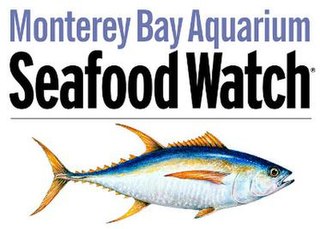
Seafood Watch is a sustainable seafood advisory list, and has influenced similar programs around the world. It is best known for developing science-based seafood recommendations that consumers, chefs, and business professionals use to inform their seafood purchasing decisions.
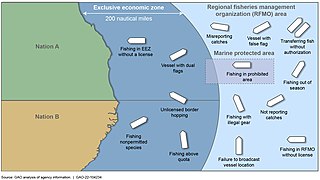
Illegal, unreported and unregulated fishing (IUU) is an issue around the world. Fishing industry observers believe IUU occurs in most fisheries, and accounts for up to 30% of total catches in some important fisheries.

John West Foods is a United Kingdom-based seafood marketing company established in 1857, and currently owned by Thai Union Group of Thailand. The company produces canned salmon and tuna, as well as mackerel, sardine, herring, brisling, anchovies and shellfish.
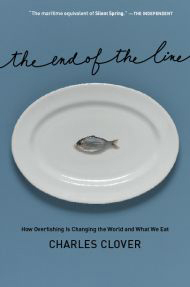
The End of the Line: How Overfishing Is Changing the World and What We Eat is a book by journalist Charles Clover about overfishing. It was made into a movie released in 2009 and was re-released with updates in 2017.
Sustainable seafood is seafood that is caught or farmed in ways that consider the long-term vitality of harvested species and the well-being of the oceans, as well as the livelihoods of fisheries-dependent communities. It was first promoted through the sustainable seafood movement which began in the 1990s. This operation highlights overfishing and environmentally destructive fishing methods. Through a number of initiatives, the movement has increased awareness and raised concerns over the way our seafood is obtained.
A community-supported fishery (CSF) is an alternative business model for selling fresh, locally sourced seafood. CSF programs, modeled after increasingly popular community-supported agriculture programs, offer members weekly shares of fresh seafood for a pre-paid membership fee. The first CSF program was started in Port Clyde, Maine, in 2007, and similar CSF programs have since been started across the United States and in Europe. Community supported fisheries aim to promote a positive relationship between fishermen, consumers, and the ocean by providing high-quality, locally caught seafood to members. CSF programs began as a method to help marine ecosystems recover from the effects of overfishing while maintaining a thriving fishing community.
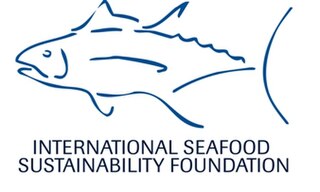
International Seafood Sustainability Foundation (ISSF) was formed in 2009 as a global, non-profit partnership among the tuna industry, scientists and World Wide Fund for Nature. The multistakeholder group states its mission is "to undertake science-based initiatives for the long-term conservation and sustainable use of tuna stocks, reducing bycatch and promoting ecosystem health". Regional Fisheries Management Organizations (RFMOs) are primarily responsible for managing the world's tuna stocks—skipjack, yellowfin and albacore tuna, the species most commonly processed for canned and shelf-stable tuna products, but their parliamentary procedures too often allow the short-term economic and political interests of nations to prevent sustainable measures from being adopted. ISSF works to ensure that effective international management practices are in place to maintain the health of all the tuna stocks.

Thai Union Group PCL is a Thailand-based producer of seafood based products. It was founded in 1977, and was listed on the Stock Exchange of Thailand (SET) on 22 November 1994.

The Wild Salmon Center (WSC) is an international conservation organization that works to protect wild salmon, steelhead, char, trout and the ecosystems on which these species depend. Headquartered in Portland, Oregon, United States, the WSC works with communities, businesses, governments, and other non-profits to protect and preserve healthy salmon ecosystems in the North Pacific. WSC programs range in location from Russia, Japan, Alaska, British Columbia, Washington State, Oregon, and California.

The Fisheries Research and Development Corporation (FRDC) is a statutory corporation that manages research and development investment by the Australian Government and the Australian fishing and aquaculture commercial, recreational and Indigenous sectors.
The following outline is provided as an overview of and topical guide to fisheries:
Saltwater fish, also called marine fish or sea fish, are fish that live in seawater. Saltwater fish can swim and live alone or in a large group called a school.

Feng Sushi is a UK-based restaurant chain known for advocating sustainable fish farming. The company was founded in 1999 by chef Silla Bjerrum and chef Jeremy Rose, with restaurant entrepreneur Luke Johnson the majority owner since 2010.

















